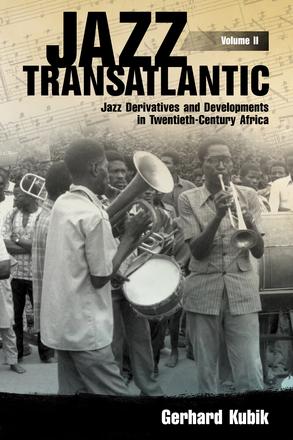
Jazz Transatlantic, Volume II
Jazz Derivatives and Developments in Twentieth-Century Africa
The conclusion of a monumental study of jazz and its lasting influence
Description
A CHOICE 2018 Outstanding Academic Title
In Jazz Transatlantic, Volume II, renowned scholar Gerhard Kubik extends and expands the epic exploration he began in Jazz Transatlantic, Volume I. This second volume amplifies how musicians influenced by swing, bebop, and post-bop in Africa from the end of World War II into the 1970s were interacting with each other and re-creating jazz. Much like the first volume, Kubik examines musicians who adopted a wide variety of jazz genres, from the jive and swing of the 1940s to modern jazz. Drawing on personal encounters with the artists, as well as his extensive field diaries and engagement with colleagues, Kubik looks at the individual histories of musicians and composers within jazz in Africa. He pays tribute to their lives and work in a wider social context.
The influences of European music are also included in both volumes as it is the constant mixing of sources and traditions that Kubik seeks to describe. Each of these groundbreaking volumes explores the international cultural exchange that shaped and continues to shape jazz. Together, these volumes culminate an integral recasting of international jazz history.
Reviews
"He has insights into the importance of musicians barely known on this side of the Atlantic, among them Winston Mankunku Ngozi, Donald Kachamba, and Duke Makasi. These valuable volumes will endure."
- Doug Ramsey, Rifftides
"These books will be must-haves for institutional libraries and are worth considering for advanced music programs."
- Joe Bebco, The Syncopated Bookshelf
"The culmination of over 60 years of field research and immense learning, Jazz Transatlantic is a remarkable contribution to the academic literature and a milestone achievement for Gerhard Kubik. To a degree never before achieved, it distills what can be known of the African cultural and musical contribution to jazz."
- Joe Bebco, The Syncopated Times
"Gerhard Kubik is one of a few ethnomusicologists specializing in Africa who have a familiarity with jazz. . . . [Jazz historians] should also use Kubik's findings to write new chapters about Africa's musical past and present in their histories."
- Edward Komara, ARSC Journal
"These two volumes are thought-changers."
- Duncan Heining, Popular Music
"Kubik has done the field a great service by providing this synthetic account of his own work. Although contemporary work in the field has justifiably critiqued the legacy of Herskovits and comparative musicology, Kubik has shown us the power of sustained fieldwork to generate audiovisual materials that will likely outlive the weaknesses of the conceptual academic frameworks that shaped their collection."
- Ingrid Monson, Harvard University, Ethnomusicology, Vol. 64, No. 1, Winter 2020
"With Jazz Transatlantic, Gerhard Kubik has demonstrated, once again, that he is a seasoned researcher, scholar, and educator. Kubik leaves no stone unturned. Jazz Transatlantic synthesizes known knowledge about the genesis and dissemination of the word jazz and its practice as seen in the light of a new intellectual prism on both sides of the Atlantic. He avoids fashionable jargon and uses simple language accessible to readers of all levels. The author has cast the jazz topic in a mixture of related stories, such as the rise of samba in Brazil and the development of Congolese popular music, in order to create a broader picture of jazz. Jazz Transatlantic is divided into two volumes. Each volume does not contain mere reporting of ethnographic data and reviews of the existing literature on jazz, but an excursion into learning experience about more than music. It is contextualized in a broader cultural frame of reference and interpreted in light of theory and methodology from the fields of history, anthropology, linguistics, psychology, and ethnomusicology. In short, Jazz Transatlantic is quintessential research, par excellence, with which to unveil the significance, and to decipher the meaning, of any cultural expression."
- Dr. Kazadi wa Mukuna, professor of ethnomusicology and director of the African Ensemble at the Hugh A. Glauser School of Music, Kent State University